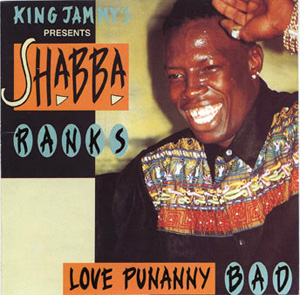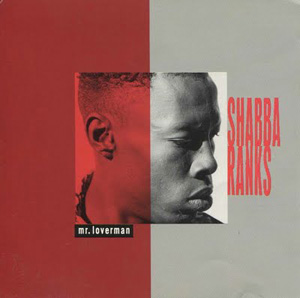
A$AP Ferg’s recent tune “Shabba” celebrates the man born Rexton Gordon: “Eight gold rings like I’m Sha-Shabba Ranks,” goes the chorus, “Four gold chains like I’m Sha-Shabba Ranks.” Kanye West, for his part, insists that he’s “the new Shabba” on Yeezus’ “Guilt Trip”, but it’d be tough to top the original.
Though rising to fame in Jamaica and then the rest of the world more than 25 years ago, Shabba Ranks is a quintessential dancehall artist: infectious, upbeat, entertaining. And perhaps that’s what Kanye is trying to channel through the pile of Jamaican samples on his latest. Perhaps Jay-Z is trying to do so, too, with his use of a sample from a Sizzla song, “Solid as a Rock”, on Magna Carta Holy Grail.
Dancehall and hip-hop are indeed related: The chatting over rhythmic tracks that was going on in 1960s Jamaica was brought to New York by Kingstonian immigrants, namely DJ Kool Herc, placing dancehall as the parent and hip-hop the prodigious child. And Kanye isn't the first to mention Shabba, as there have been numerous hip-hop songs that shout out Mr. Loverman from his heyday in the early 90s to today.
The sound of Shabba is, outside of Jamaica, synonymous with the sound of dancehall. An artist who was originally dubbed Co-Pilot, he thankfully changed this less-than-memorable moniker to a name that can also be a verb (one can, for example, engage in “Shabba Ranking”). His ladies-man image, signature Gumby haircut, flowing suits, manicured eyebrows, and the aforementioned gold jewelry, made him stand out. But it was his deep, gravelly, staccato vocals alongside some terrifically danceable rhythms and contagious hooks that led to a major label record deal in the States.
Shabba’s vocal style is that of a “deejay,” the Jamaican term for what in hip-hop is the MC, stemming from the late 1950s, when Jamaica’s mobile sound system selectors would imitate American radio DJs as they introduced songs. These intros eventually bled into the songs themselves. Shabba was not the first deejay to be signed to a U.S. major-- Yellowman, Lieutenant Stitchie, and Super Cat had all been picked up previously-- but he is arguably the definitive artist of the genre, regardless of the fact that he basically disappeared from the spotlight after the early 90s.
Even after having virtually no hits for almost 20 years, it’s amazing how much of a response a Shabba tune still gets in Jamaica.
Rexton Rawlston Fernando Gordon was born in 1966 in the countryside of Jamaica-- hailing from St. Ann, the same parish as Bob Marley and Burning Spear. Moving to the capital at the age of eight, he was raised in Trenchtown and remembers getting involved in music from the ground up: He apparently worked collecting discarded bottles at street dances when he was 14. He started performing with legendary artist Admiral Bailey on the Roots Melody sound system in the early 80s, and fellow deejay Josey Wales introduced the young talent to then-super-producer King Jammy. By the end of the decade, Shabba Ranks was a bona fide superstar in Jamaica, and Epic took notice, signing him in 1989. In a 2012 interview, Shabba said that he was a troublemaker as a young man-- in his words, “me not a soft soap inna wata.” And he certainly got himself in trouble just as his star was rising worldwide.
With hit after hit, Shabba won back-to-back Best Reggae Album Grammys in 1991 and 1992 (for X-Tra Naked and As Raw as Ever, respectively). But it was the end of the line when, on the December 4, 1993, broadcast of UK show "The Word", Shabba revealed his support for the virulently homophobic views many Jamaican dancehall artists have since become infamous for. Shabba issued an apology, but his career really never recovered-- and saying sorry, along with his focus on the crossover market, meant that he was viewed as a watered-down apologist in Jamaica. He eventually moved from Kingston to New York.
Though his offensive views caused Shabba to disappear from the public eye, his music has had staying power. Because of the sheer number and popularity of his songs, no reggae set anywhere-- from nightclub to wedding-- seems to happen without at least a little bit of “Mr. Loverman” or “Twice My Age”. Even after having virtually no hits in almost 20 years, it’s also amazing how much of a response a Shabba tune still gets in Jamaica. It’s not surprising to hear four, five, or even six Shabba Ranks songs played in a row to an appreciative crowd.
Beenie Man and Yellowman may contest each other for the title of King of the Dancehall, but, in a Napoleonic move, Shabba has crowned himself Emperor. Last summer, there was quite a hullabaloo in Jamaica surrounding his prodigal return for a performance at the country’s annual reggae and dancehall music showcase, SumFest-- his first Jamaican gig in more than a decade; as part of his extensive introduction, veteran Jamaican radio DJ Barry G reminded the crowd that a whole generation had not witnessed the stage-stylings of Shabba. Along with a catalogue of hits, Shabba also possesses stage presence that puts contemporary deejays to shame. He easily put on the best show of Sumfest (and left out any offensive lyrics).
At the end of the night, Shabba brought his wife and sons up on stage.“Not only gunshot can come out of the ghetto,” he said, “I’m a natural proof of ghetto progress.” In the 90s, Shabba Ranks introduced dancehall to the rest of the world. Perhaps it’s just taken a couple of decades for American music to get fully acquainted.
Listen along to the following 10 Shabba Ranks career highlights with this Spotify playlist.
 “Love Punanny Bad” (1987)
“Love Punanny Bad” (1987)
Produced by King Jammy, this tune is representative of a whole range of what are called “slack”-- sexually explicit-- lyrics in Jamaica. But the slackness didn’t seem to stop this tune from being included on the Grammy-winning Xtra-Naked. “Wicked in Bed” and “Needle Eye Pum Pum” are other examples of Shabba’s talent for what some might deem tasteless. It's not the first track Shabba ever did, but it's certainly representative of the majority of his oeuvre.
“Get Up Stand Up and Rock” (1987)
Regardless of the title, this King Jammy-produced tune isn’t about the same thing Bob Marley sang about. This is a straight celebration of the dancehall-- a space where women wine, music plays, and people dance until the morning. The China Town riddim bounces along as Shabba celebrates celebrating.
“Twice My Age” [ft. Krystal] (1988)
A standard of any respectable DJ’s reggae set, “Twice My Age” has a hook that hangs around. Performed by Krystal and Shabba, this hit could be a companion to JC Lodge's 1989 track “Telephone Love”-- both tunes were produced by Gussie Clarke-- which is not quite as legendary as “Twice”, but still quite nice.
“Dem Bow” (1990)
Steely and Clevie produced many of the top riddims throughout the 90s. Given that the Jamaican music industry is fueled by multiple songs on the same riddim, it’s no surprise that this one became the basis for a whole genre of music, alternately called Reggaeton or simply Dembow. When stripped of its homophobic lyrics, the boom-cha-boom-chick of “Dem Bow” took on a life of its own.
“Trailer Load a Girls” (1991)
Another Steely and Clevie production, this is also one of Shabba’s biggest crossover hits. The upbeat riddim, entitled “Poco ManJam”, is a great example of the light and lively 90s dancehall style.
“Ting-a-ling” (1992)
Again, a Steely and Clevie production, this track has some of the most memorable lines in dancehall: “Ting-a-ling-a-ling, dancehall in swing, deejay ears cock up when dem hear boom riddim/ Ting-a-ling-a-ling, schoolbell a ring, knife and fork ah fight fidumpling.” The song is also one of the best uses of “booyaka, booyaka” (the best, of course, being M-Beat and General Levy’s “Incredible”).
 “Mr. Loverman” [ft. Chevelle Franklyn] (1988/1992)
“Mr. Loverman” [ft. Chevelle Franklyn] (1988/1992)
Before there was “Mr. Loverman”, there was “Champion Lover” by British-Guyanese lovers rock singer Deborahe Glasgow. It became Shabba’s most recognizable song, complete with the telltale cries of “Shabba!” Due to illness caused by the cancer that eventually took Glasgow’s life in 1994, the song was rerecorded with Chevelle Franklyn, who has been the voice of the tune's chorus ever since. The Clifton Dillon and Mikey Bennett-produced track was, however, parodied by Marlon Wayans on "In Living Color" as “Mr. Uglyman”. Not that this would have bothered Shabba: He calls himself “Big Dutty Stinking Shabba” in his stage intros, justifying it by saying that since he’s already dealt himself an insult, no one can do worse.
“Love Me Truly” [ft. Cocoa Tea] (1994)
The many combination tunes that Shabba has done with conscious roots and culture artist Cocoa Tea demonstrate that there is more than one side to the man who “love punnany bad.” Along with the sweet “Love Me Truly”, there is the fun “Which One She Love”, the hymn to pan-Africanism and Rastafari, “Flag Flown High”, and “Pirates Anthem” with Home-T, on the same riddim as “Telephone Love”.
“Respect” (1995)
Here, Shabba demands respect for those who came before. This Bobby Digital and Clifton Dillon-produced tune may feature some excellent deejaying on the same riddim as Barrington Levy’s classic “Murderer”, but this song didn’t reach the heights of Shabba’s previous work. He was already on a downward spiral both in and out of Jamaica, so the quality of this tune and the demand of its title wasn’t greeted with the respect he wished for.
“None a Dem” (2011)
Before his triumphant return in 2012 for Sumfest, Shabba recorded a tune with contemporary dancehall hit maker Stephen “di Genius” McGregor. Much like the lyrical content of “Respect”, Shabba demands reverence for those who have paid their dues. “None a Dem” did not reach past peaks, but it demonstrates that there’s probably more that Shabba has to offer.
Further listening:
“Born as a Don”, “PeenyPeeny”, “Gal Yuh Good”, “Hood Top”, “Caan Dun”, “Roots and Culture”,“Original Fresh”, “Slow and Sexy”, “House Call”, and “Shine andCriss”. Also, in light of Snoop Lion’s recent track with Eddie Murphy, it’s worth pointing out that Shabba already checked that box two decades ago with “I Was a King”.